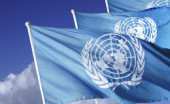Molly Minturn - My family is heartbroken to share that my father died in surgery on Monday, Feb. 10. It…
Climate change , U.N.F.C.C.C and Paris COP
Written by Diana Thebaud Nicholson // August 24, 2015 // Uncategorized // Comments Off on Climate change , U.N.F.C.C.C and Paris COP
The Weight of the World
Can Christiana Figueres persuade humanity to save itself?
On the wall by her desk there’s a framed motto that reads, “Impossible is not a fact, it is an attitude.
(The New Yorker) The United Nations Framework Convention on Climate Change, or U.N.F.C.C.C., has by now been ratified by a hundred and ninety-five countries, which, depending on how you count, represents either all the countries in the world or all the countries and then some. Every year, the treaty stipulates, the signatories have to hold a meeting—a gathering that’s known as a COP, short for Conference of the Parties. The third COP produced the Kyoto Protocol, which, in turn, gave rise to another mandatory gathering, a MOP, or Meeting of the Parties. The seventeenth COP, which coincided with the seventh MOP, took place in South Africa. There it was decided that the work of previous COPs and MOPs had been inadequate, and a new group was formed—the Ad Hoc Working Group on the Durban Platform for Enhanced Action, usually referred to as the A.D.P. The A.D.P. subsequently split into A.D.P.-1 and A.D.P.-2, each of which held meetings of its own. The purpose of the U.N.F.C.C.C. and of the many negotiating sessions and working groups and protocols it has spun off over the years is to prevent “dangerous anthropogenic interference with the climate system.” In climate circles, this is usually shortened to D.A.I. In plain English, it means global collapse.
The Framework Convention on Climate Change is overseen by an organization known as the Secretariat, which is led by a Costa Rican named Christiana Figueres. … Of all the jobs in the world, Figueres’s may possess the very highest ratio of responsibility (preventing global collapse) to authority (practically none). The role entails convincing a hundred and ninety-five countries—many of which rely on selling fossil fuels for their national income and almost all of which depend on burning them for the bulk of their energy—that giving up such fuels is a good idea. When Figueres took over the Secretariat, in 2010, there were lots of people who thought the job so thankless that it ought to be abolished. This was in the aftermath of the fifteenth COP, held in Copenhagen, which had been expected to yield a historic agreement but ended in anger and recrimination. Figueres and her team have spent the years since Copenhagen trying to learn from its mistakes. How well they have done so will become apparent three months from now, when world leaders meet for this year’s COP—the twenty-first—in Paris.

